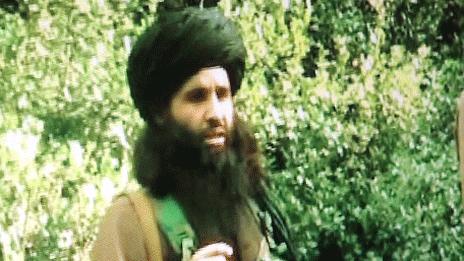Afghanistan extends ceasefire with Taliban
- Published
Tears, hugs and selfies as Afghan troops and Taliban mark a truce for Eid
Afghanistan has extended its unilateral ceasefire with the Taliban following an initial truce observed by both sides over the Eid festival period.
President Ashraf Ghani appealed to the militants to follow the government's lead and enter peace talks.
In extraordinary scenes, militants have been embracing security force members and taking selfies with citizens.
However 25 people died in a suicide attack on one gathering of Taliban and government officials in Nangarhar.
Taliban members and local residents were among the victims of the attack, province spokesman Attaullah Khogyani told the BBC, adding that 54 people were wounded.
The Islamic State group, which is active in the area, said it carried out the attack.
What did President Ghani say?
In a TV address Mr Ghani said the government was ready for "comprehensive negotiations" with the Taliban.
"All those issues and demands that have been put forth we are ready to discuss them at the peace talks," he said.
The past day - where Taliban and government forces and officials mingled during Eid al-Fitr, the end of the holy fasting month of Ramadan - "proved that we are all for peace", Mr Ghani said.
Allow X content?
This article contains content provided by X. We ask for your permission before anything is loaded, as they may be using cookies and other technologies. You may want to read X’s cookie policy, external and privacy policy, external before accepting. To view this content choose ‘accept and continue’.
During the ceasefire Taliban militants could receive medical and humanitarian assistance and Taliban prisoners could see their families, he added.
The government has also released some Taliban prisoners, he said.
US Secretary of State Mike Pompeo said peace talks would have to include a discussion on the role of "international actors and forces".
"The US stands ready to work with parties to reach a peace agreement and political settlement that brings a permanent end to this war," he said.
Earlier this month the Taliban denied that they were in secret talks with the Afghan government.
Mr Ghani has also confirmed the death of the commander of the Pakistani Taliban, Maulana Fazlullah, in a US drone strike in Afghanistan on Thursday.

Extraordinary scenes
By Anbarasan Ethirajan, BBC News
For many Afghans these are extraordinary scenes. The two sides were fighting each other just a few days ago. The unprecedented development has raised hopes of permanent peace in the war ravaged country.
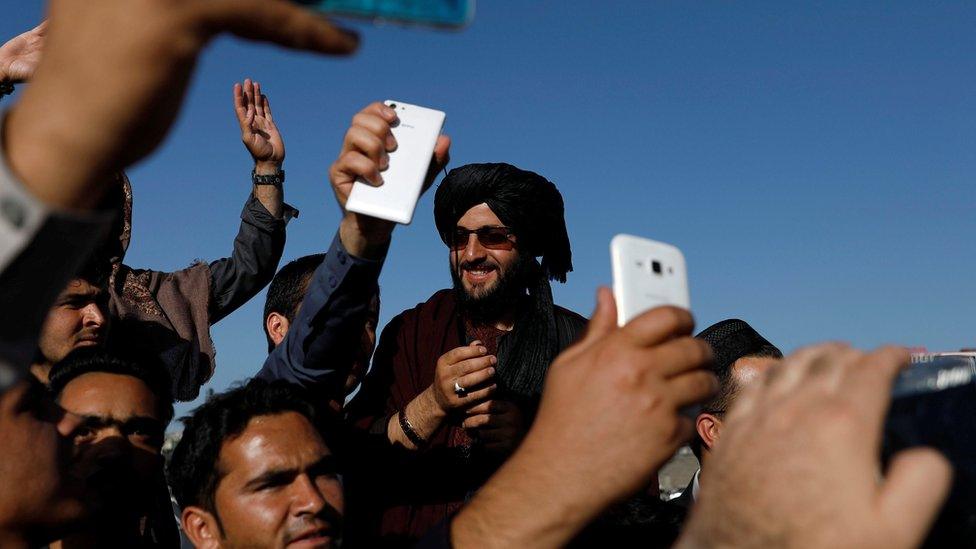
Afghans took selfies with the militants in Kabul
Neighbouring Pakistan is considered key in starting the peace process as many Afghan Taliban leaders are believed to be living inside the country.
However Islamabad accuses Kabul of harbouring Islamist insurgents who have carried out several violent attacks inside Pakistan in the past.
But the reported killing in Afghanistan of Mullah Fazlullah, one of Pakistan's most wanted militants, could address some of Islamabad's security concerns.

How did the ceasefire come about?
The Taliban announced the three-day halt to hostilities earlier this month, days after a unilateral ceasefire lasting until Wednesday was ordered by the government.
It is the Taliban's first ceasefire since the government they ran was toppled by the 2001 US-led invasion.
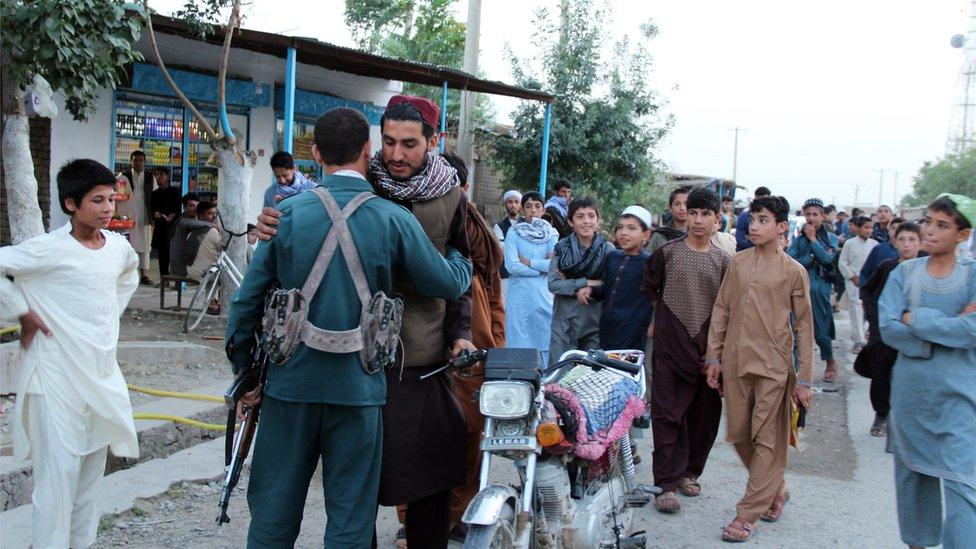
A militant hugs a member of the Afghan police in Kunduz
"It was the most peaceful Eid. For the first time we felt safe. It is hard to describe the joy," said Qais Liwal, a student in Zabul in southern Afghanistan.
Taliban and government officials performed joint Eid prayers in mosques during the truce, Mr Ghani said.
In February Mr Ghani offered peace talks "without preconditions" and recognition of the Taliban as a legitimate political group if they respected the rule of law.
Tens of thousands of Afghans have been killed since the US-led invasion drove the Taliban from power in 2001.
How does the Pakistani Taliban leader's death fit in?
In Pakistan, Interim Prime Minister Nasir-ul Mulk has said the killing of the Pakistani Taliban leader Maulana Fazlullah in a US drone strike was a significant development in the fight against terrorism.
It follows a phone call from Mr Ghani confirming the militant's death.
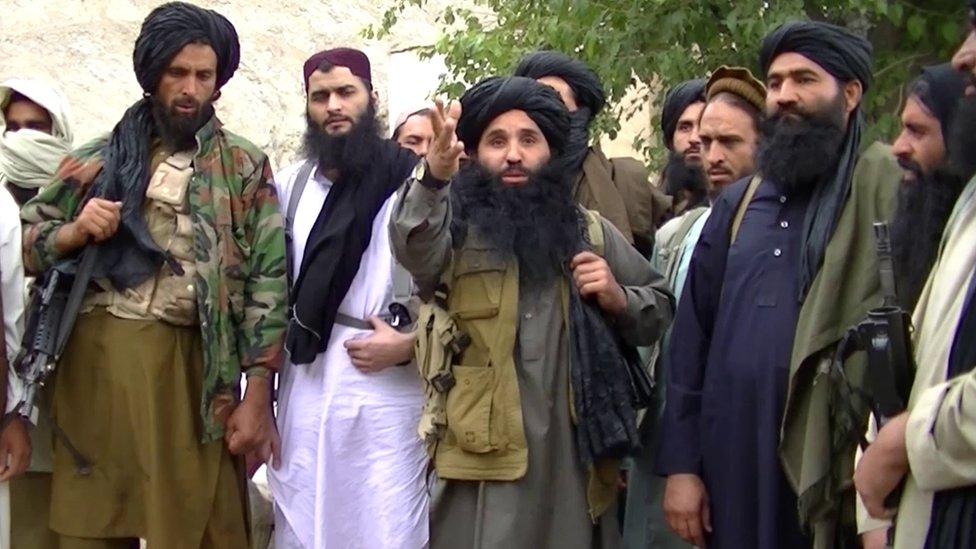
Mullah Fazlullah (centre) is shown in a video released by the Pakistan Taliban
The phone call is seen as an attempt to gain Pakistan's confidence and boost co-operation in Afghanistan's fight against militants, many of whose leaders live in Pakistan.
Fazlullah was linked to a number of attacks including a school massacre in Peshawar in 2014 that killed more than 150 people.
He also ordered the attempted murder of schoolgirl Malala Yousafzai, who was shot in the head on a school bus aged 15.
The Pakistani Taliban said at the time that they had shot her because she was "pro-West" and "promoting Western culture in Pashtun areas".
- Published7 November 2013
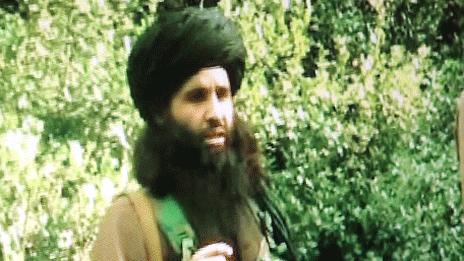
- Published15 June 2018
